Twelve Months (O dvanácti měsíčkách) is a Czech story that dates back to the 14th-century and is attributed to Mistr Klaret. At that time and through many centuries after, it served as an exemplum, or a moralizing story.
Mistr Klaret, Latin Magister Bartholomaeus de Bohemarius Solencia Dictus Claretus own name Bartholomew of Chlumec, also called Master Claret (born approx. 1320 in Chlumec nad Cidlinou – died May 3, 1370) was a Czech writer, scholar, doctor and lexicographer, canon of the cathedral of St. Vitus master of Prague University. There are many such stories attributed to his name.
Today we are please to bring you this entire story with some lovely illustrations.
We hope you enjoy it!
* * * * * * * *
There was once a woman who had two girls. One was her own daughter, the other a stepchild. Holena, her own daughter, she loved dearly, but she couldn’t bear even the sight of Marushka, the stepchild. This was because Marushka was so much prettier than Holena.
Marushka, the dear child, didn’t know how pretty she was and so she never understood why, whenever she stood beside Holena, the stepmother frowned so crossly.
Mother and daughter made Marushka do all the housework alone.
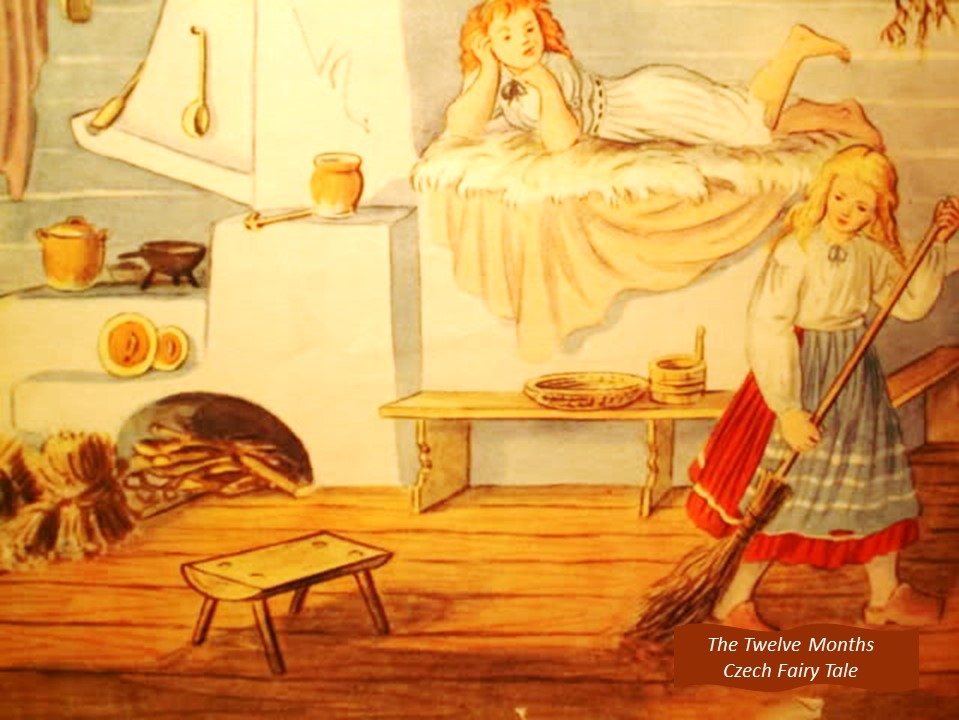
She had to cook and wash and sew and spin and take care of the garden and look after the cow. Holena, on the contrary, spent all her time decking herself out and sitting around like a grand lady.
Marushka never complained. She did all she was told to do and bore patiently their everlasting fault-finding. In spite of all the hard work she did she grew prettier from day to day, and in spite of her lazy life Holena grew uglier.
“This will never do,” the stepmother thought to herself. “Soon the boys will come courting and once they see how pretty Marushka is, they’ll pay no attention at all to my nHolena. We had just better do all we can to get rid of that Marushka as soon as possible.”
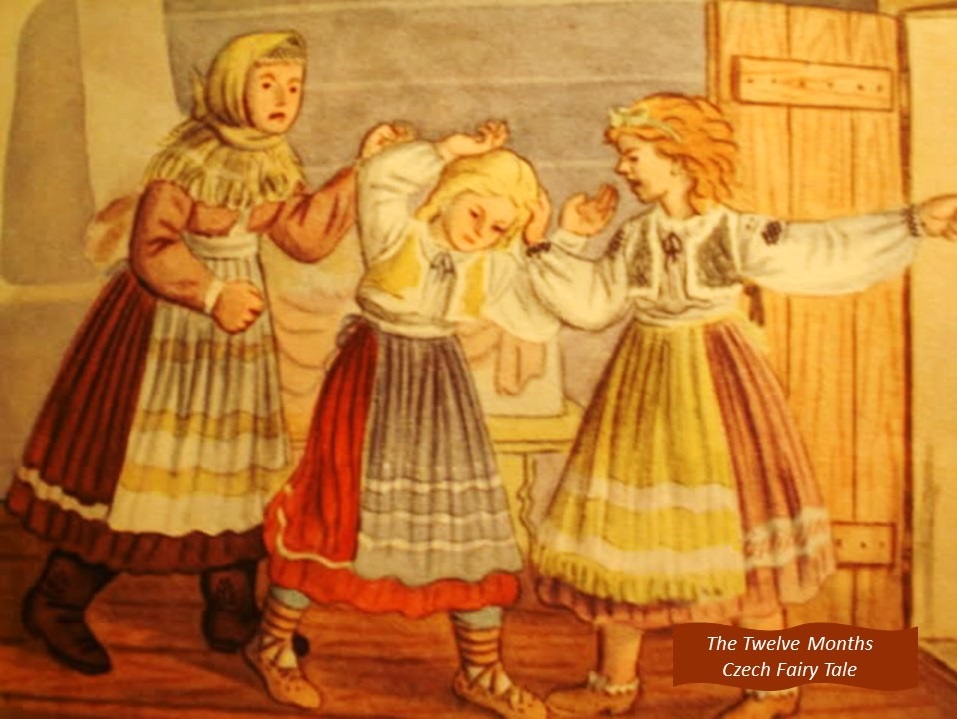
So they both nagged Marushka all day long. They made her work harder, they beat her, they didn’t give her enough to eat, they everything they could think of to make her ugly and nasty. But all to no avail. Marushka was so good and sweet that, in spite of all their harsh treatment, she kept on growing prettier.
One day in the middle of January Holena took the notion that nothing would do but she must have a bunch of fragrant violets to put in her bodice.
“Marushka!” she ordered sharply. “I want some violets. Go out in the forest and get me some.”
“Good heavens, my dear sister!” cried poor Marushka. “What can you be thinking of? Whoever heard of violets growing under the snow in January?”
“What, you lazy little slattern!” Holena shouted. “You dare to argue with me! You go this minute and if you come back without violets I’ll kill you!”
The stepmother sided with Holena and, taking Marushka roughly by the shoulder,she pushed her out of the house and slammed the door.
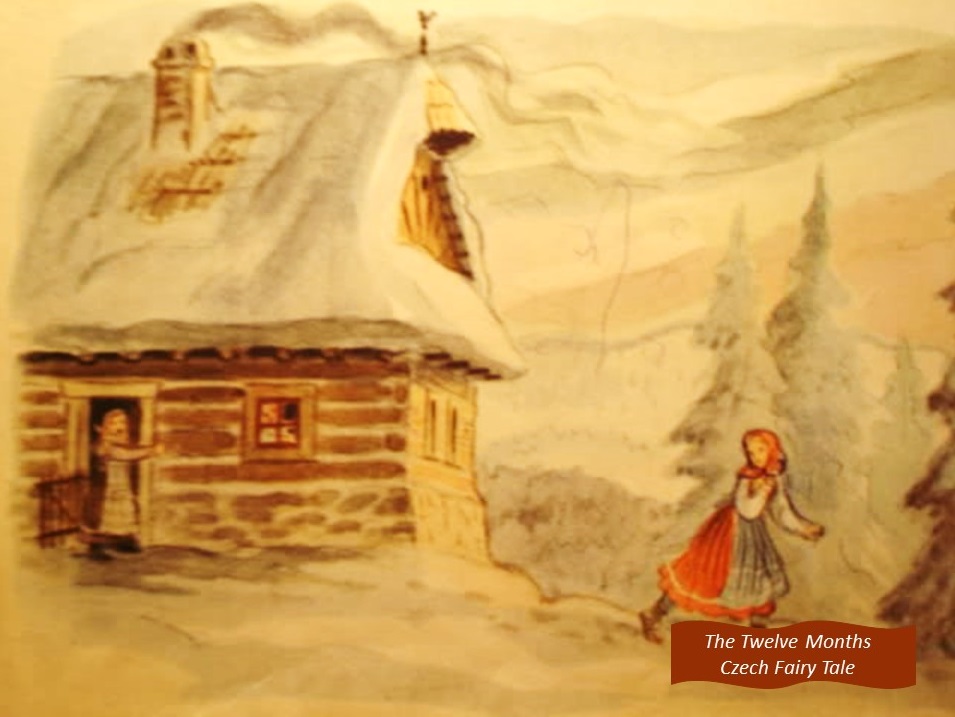
The poor child climbed slowly up the mountain side weeping bitterly. All around the snow lay deep with no track of man or beast in an direction. Marushka wandered on and on, weak with hunger and shaking with cold.
“Dear God in heaven,” she prayed, “take me to yourself away from all this suffering.”
Suddenly ahead of her she saw a glowing light. She struggled towards it and found at last that it came from a great fire that was burning on the top of the mountain.
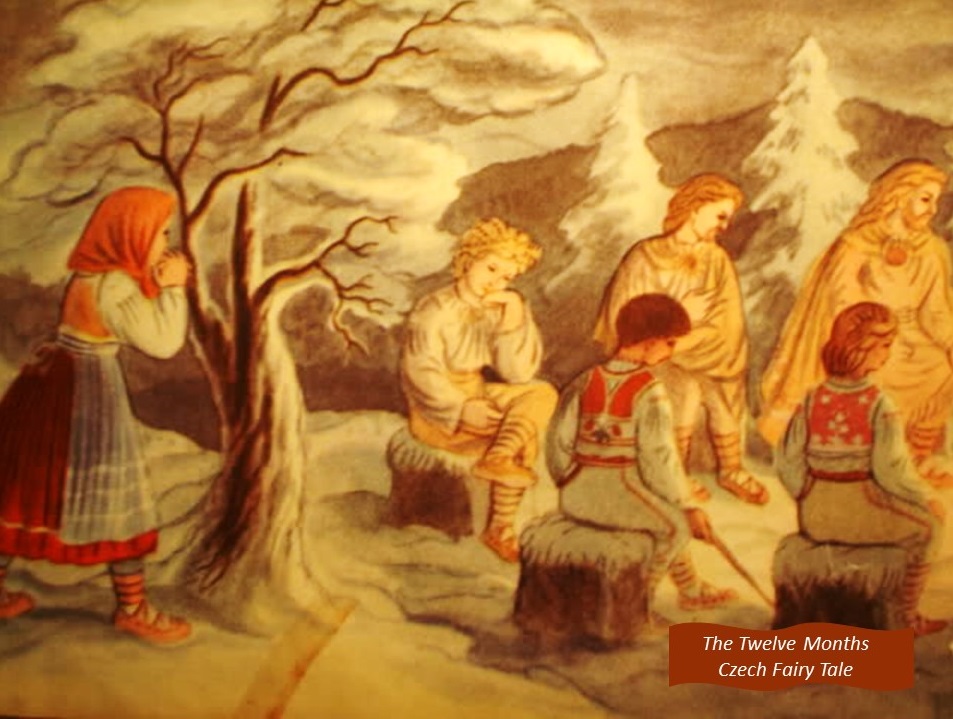
Around the fire were twelve stones, one of them much bigger and higher than the rest. Twelve men were seated on the stones. Three of them were very old and white; three were not so old; three were middle-aged; and three were beautiful youths. They did not talk. They sat silent gazing at the fire. They were the Twelve Months.
For a moment Marushka was frightened and hesitated. Then she stepped forward and said, politely:
“Kind sirs, may I warm myself at your fire? I am shaking with cold.”
Great January nodded his head and Marushka reached her stiff fingers towards the flames.
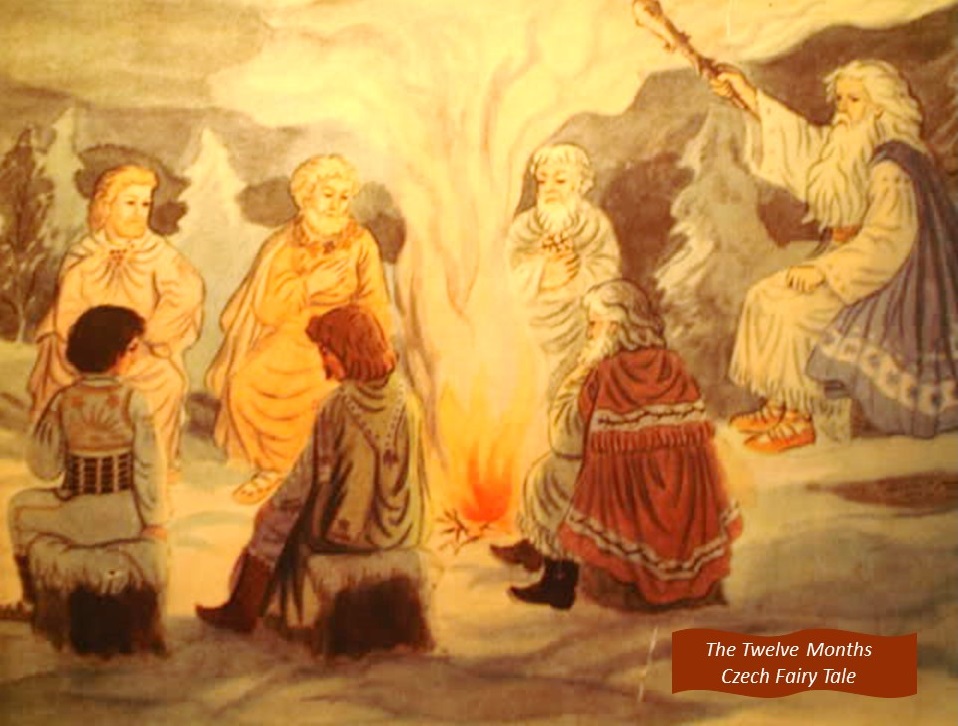
“This is no place for you, my child,” Great January said. “Why are you here?”
“I’m hunting for violets,” Marushka answered.
“Violets? This is no time to look for violets with snow on the ground!”
“I know that, sir, but my sister, Holena, says I must bring her violets from the forest or she’ll kill me and my mother says so, too. Please, sir, won’t you tell me where I can find some?”
Great January slowly stood up and walked over to the youngest month. He handed him a long staff and said:
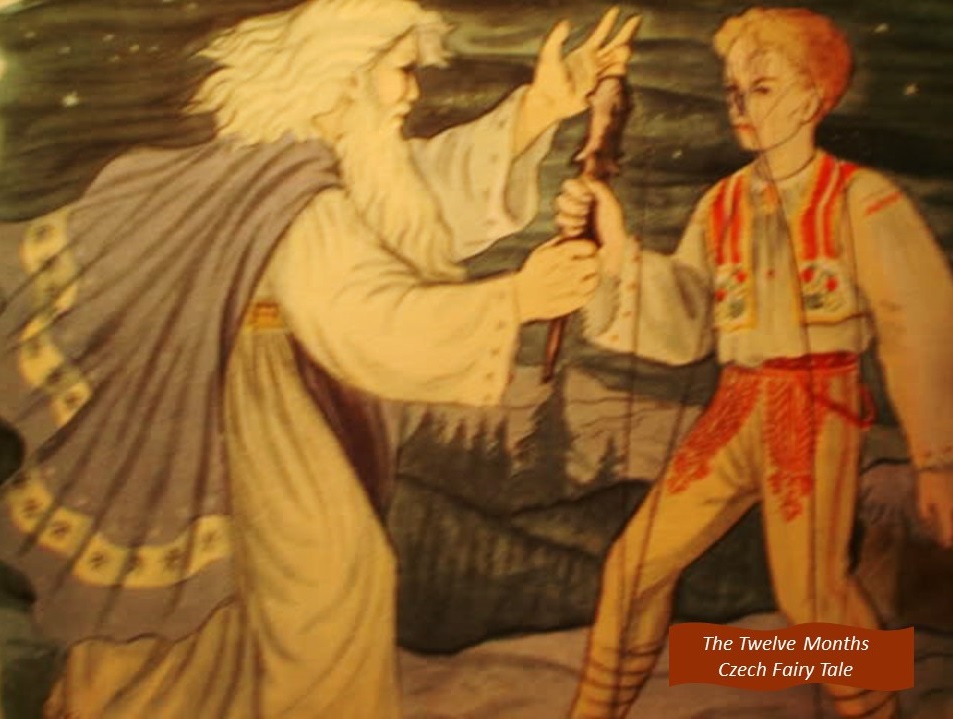
“Here, March, you take the high seat.”
So March took the high seat and began waving the staff over the fire. The fire blazed up and instantly the snow all about began to melt. The trees burst into bud; the grass revived; the little pink buds of the daisies appeared; and, lo, it was spring!
While Marushka looked, violets began to peep out from among the leaves and soon it was as if a great blue quilt had been spread on the ground.
“Now, Marushka,” March cried, “there are your violets! Pick them quickly!”
Marushka was overjoyed.
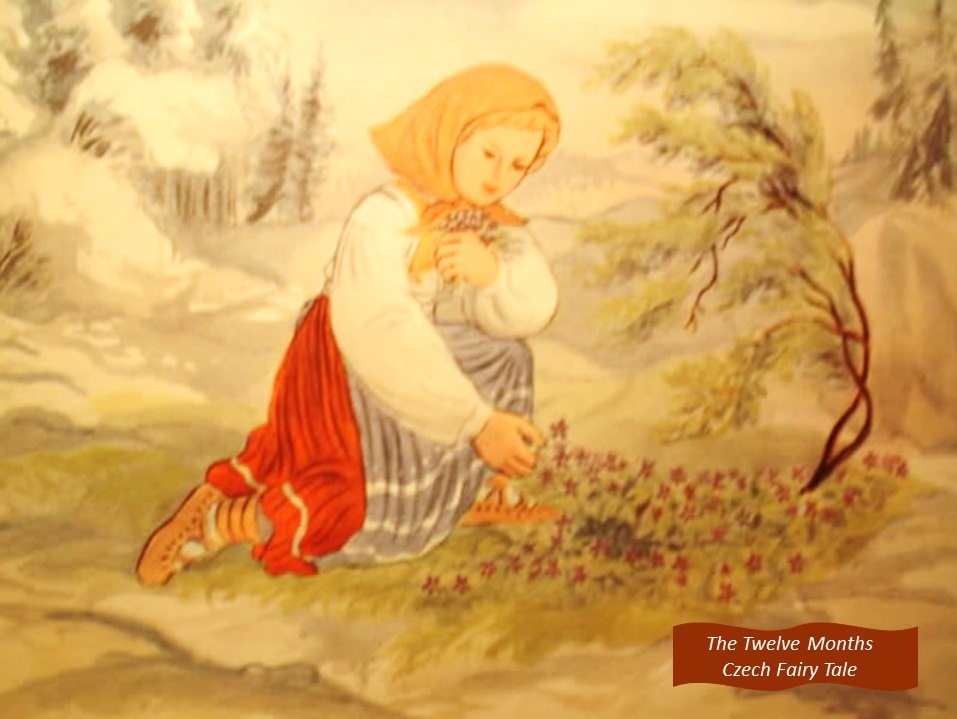
She stooped down and gathered a great bunch. Then she thanked the Months politely, bade them good-day, and hurried away.
Just imagine Holena and her stepmother’s surprise when they saw Marushka coming home through the snow with her hands full of violets. They opened the door and instantly the fragrance of the flowers filled the cottage.
“Where did you get them?” Holena demand rudely.
“High up in the mountain,” Marushka said. “The ground up there is covered with them.”
Holena snatched the violets and fastened them in her waist. She kept smelling them herself all afternoon and she let her mother smell them, but never once said to Marushka:
“Dear sister, won’t you take a smell?”
The next day as she was sitting idle in the chimney corner she took the notion that she must have some strawberries to eat. So she called Marushka and said:
“Here you, Marushka, go out to the forest and get me some strawberries.”
“Good heavens, my dear sister,” Marushka said, “where can I find strawberries this time of year? Whoever heard of strawberries growing under the snow?”
“What, you lazy little slattern!” Holena shouted. “You dare to argue with me! You go this minute and if you come back without strawberries, I’ll kill you!”
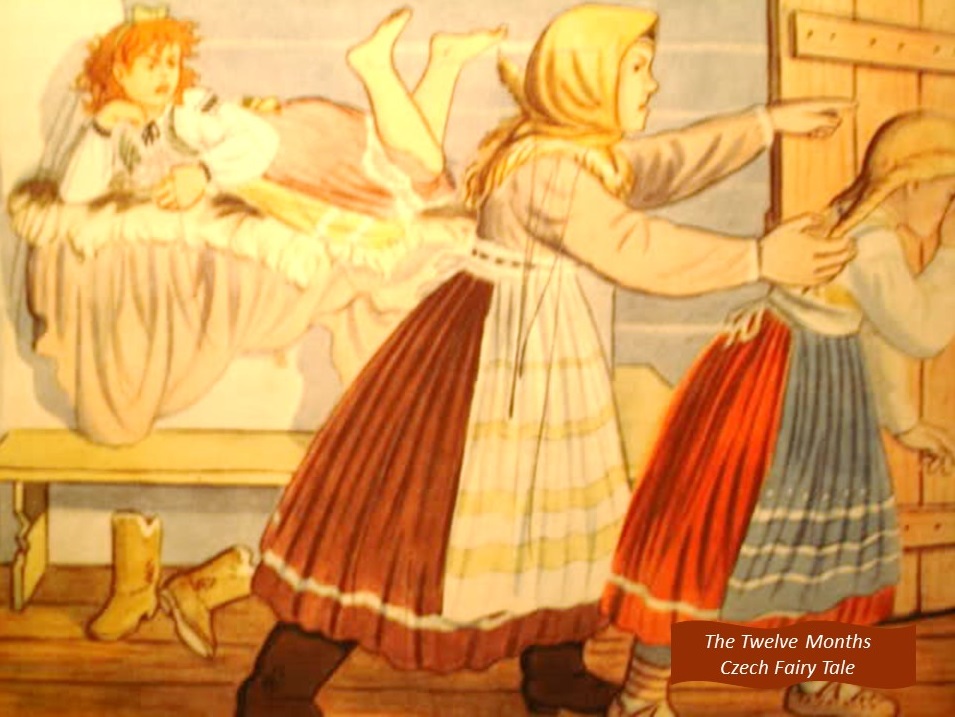
Again the stepmother sided with Holena, and taking Marushka roughly by the shoulder, she pushed her out of the house and slammed the door.
Again the poor child climbed slowly up the mountain side weeping bitterly. All around the snow lay deep with no track of man or beast in any direction. Marushka wandered on and on, weak with hunger and shaking with cold. At last she saw ahead of her the glow of the same fire that she had seen the day before.
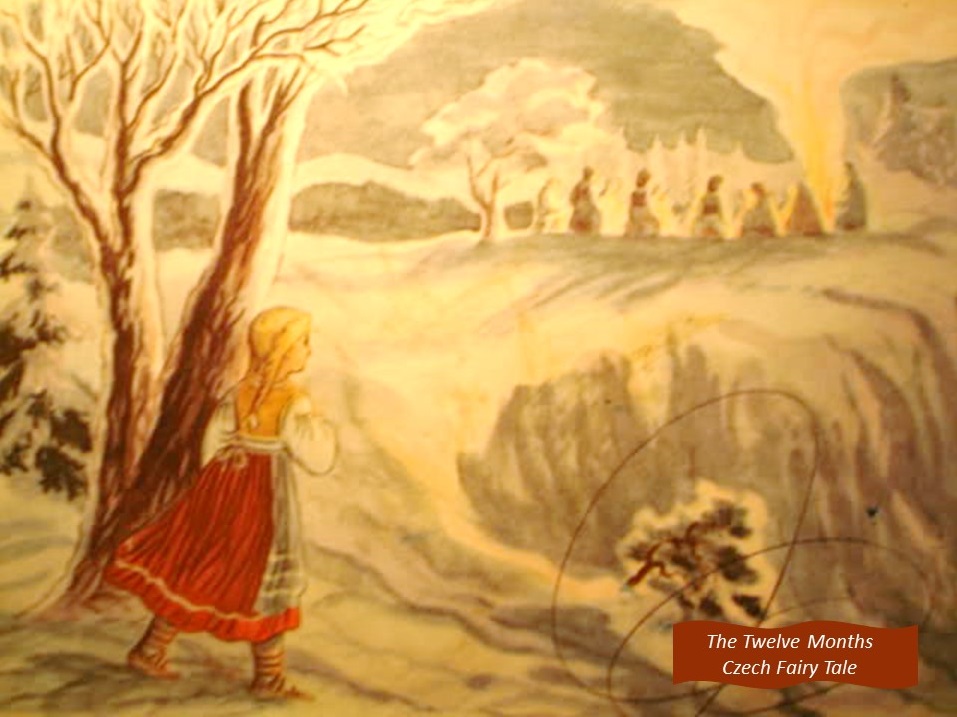
With happy heart she hastened to it. The Twelve Months were seated as before with Great January on the high seat. Marushka bowed politely and said:
“Kind sirs, may I warm myself at your fire? I am shaking with cold.”
Great January nodded and Marushka reached her stiff fingers towards the flames. “But Marushka,” Great January said, “why are you here again? What are you hunting now?”
“I’m hunting for strawberries,” Marushka answered.
“Strawberries? But, Marushka, my child, it is winter and strawberries do not grow in the
snow.”
Marushka shook her head sadly. “I know that, sir, but my sister, Holena, says I must bring her strawberries from the forest or she will kill me and my mother says so, too. Please, sir, won’t you tell me where I can find some?”
Great January slowly stood up and walked over to the Month who sat opposite him. He handed him the long staff and said: “Here, June, you take the high seat.”
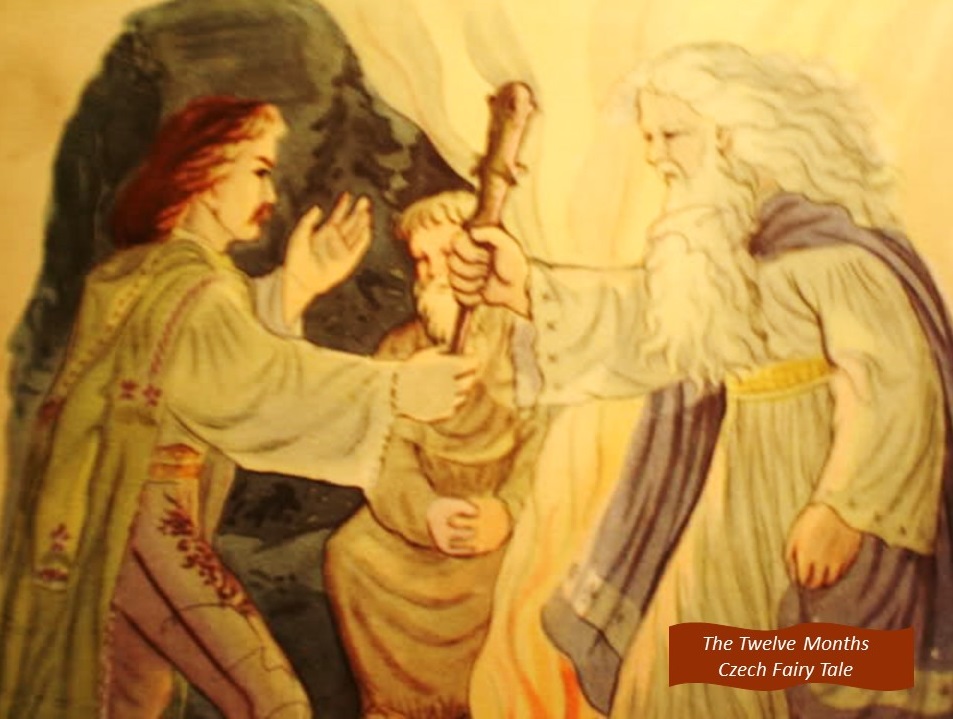
So June took the high seat and began waving the staff over the fire. The flames blazed high and with the heat the snow all about melted instantly. The earth grew green; the trees decked themselves in leaves; the birds began to sing; flowers bloomed and, lo, it was summer!
Presently little starry white blossoms covered the ground under the beech trees. Soon these turned to fruit, first green, then pink, then red, and, with a gasp of delight, Marushka saw that they were ripe strawberries.
“Now, Marushka,” June cried, “there are your strawberries! Pick them quickly!”
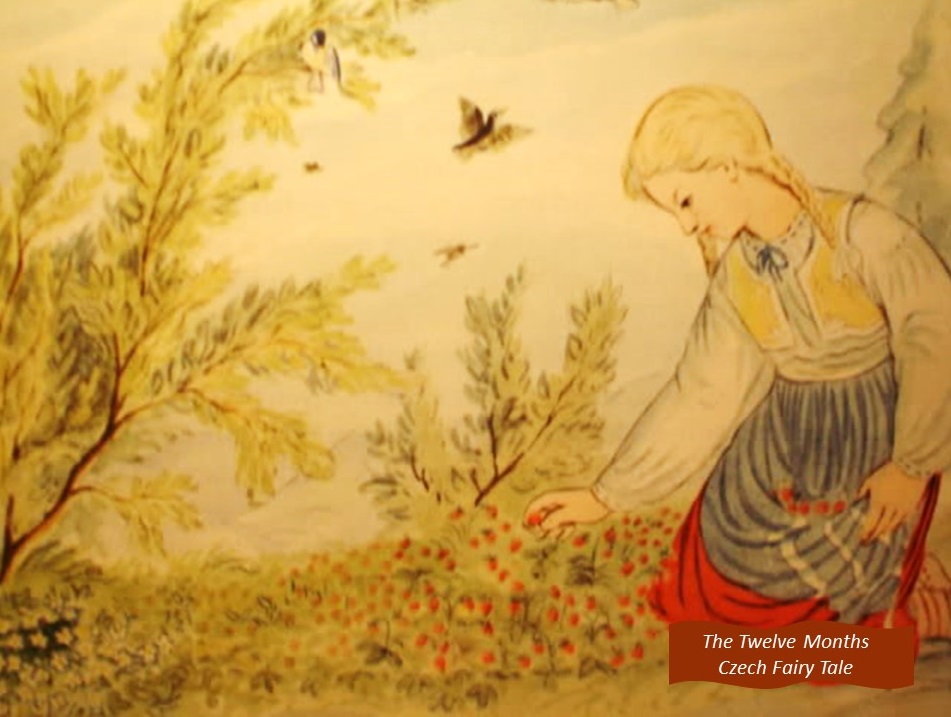
Marushka picked an apron full of berries. Then she thanked the Months politely, bade them good-bye, and hurried home.
Just imagine again Holena and the stepmother’s surprise as they saw Marushka coming through the snow with an apron full of strawberries!
They opened the door and instantly the fragrance of the berries filled the house.
“Where did you get them” Holena demanded rudely.
“High up in the mountain,” Marushka answered, “under the beech trees.”
Holena took the strawberries and gobbled and gobbled and gobbled. Then the stepmother ate all she wanted. But it never occurred to either of them to say: “Here, Marushka, you take one.”
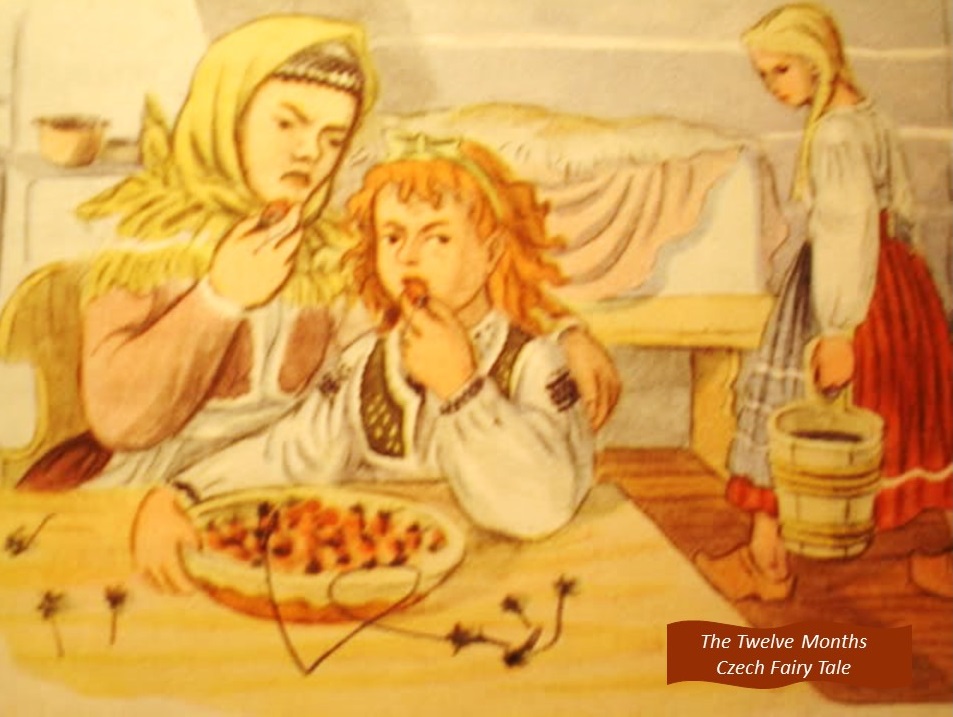
The next day when Holena was sitting idle, as usual, in the chimney corner, the notion took her that she must have some red apples. So she called Marushka and said: “Here you, Marushka, go out to the forest and get me some red apples.”
“But, my dear sister,” Marushka gasped, “where can I find red apples in winter?”
“What, you lazy little slattern, you dare to argue with me! You go this minute and if you come back without red apples I’ll kill you!”
For the third time the stepmother sided with Holena and, taking Marushka roughly by the shoulder, pushed her out of the house and slammed the door.
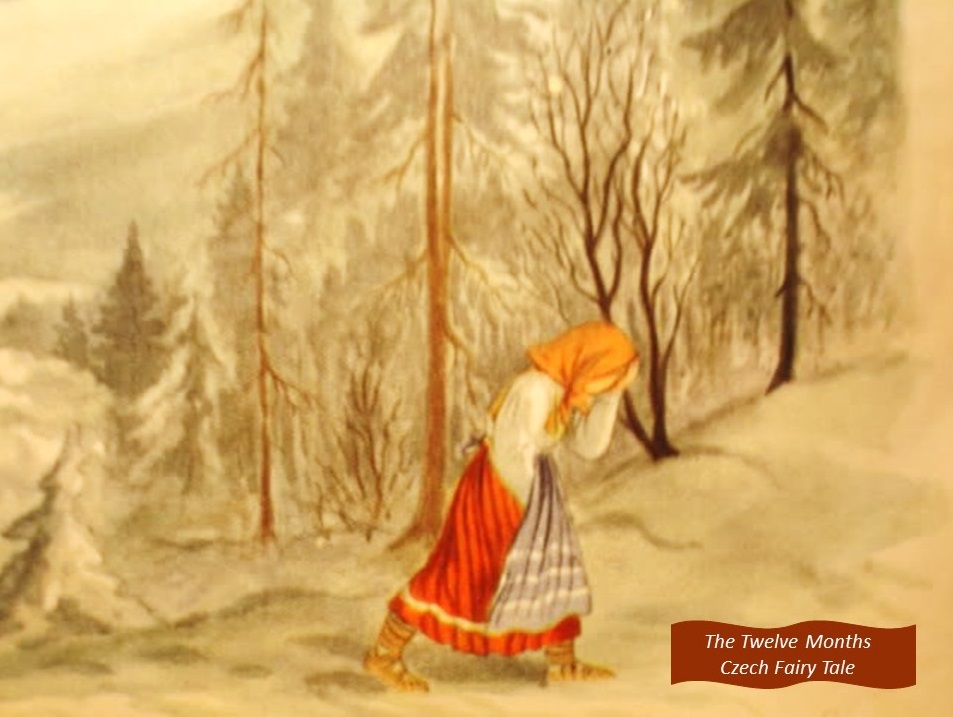
So again the poor child went into the forest. All around the snow lay deep with no track of man or beast in any direction. This time Marushka hurried straight to the mountain top. She found the Months still seated about their fire with Great January still on the high stone.
Marushka bowed politely and said: “Kind sirs, may I warm myself at your fire? I am shaking with cold.”
Great January nodded and Marushka reached her stiff fingers towards the flames.
“Why are you here again, Marushka?” Great January asked. “What are you looking for now?”
“Red apples,” Marushka answered. “My sister, Holena, says I must bring her some red apples from the forest or she will kill me, and my mother says so, too. Please, sir, won’t you tell me where I can find some?”
Great January slowly stood up and walked over to one of the older Months. He handed him the long staff and said: “Here, September, you take the high seat.”
So September took the high seat and began waving the staff over the fire. The fire burned and glowed. Instantly the snow disappeared. The fields about looked brown and yellow and dry. From the trees the leaves dropped one by one and a cool breeze scattered them over the stubble.
There were not many flowers, only wild asters on the hillside, and meadow saffron in the valleys, and under the beeches ferns and ivy. Presently Marushka spied an apple-tree weighted down with ripe fruit.
“There, Marushka,” September called, “there are you apples. Gather them quickly.”
Marushka reached up and picked one apple.
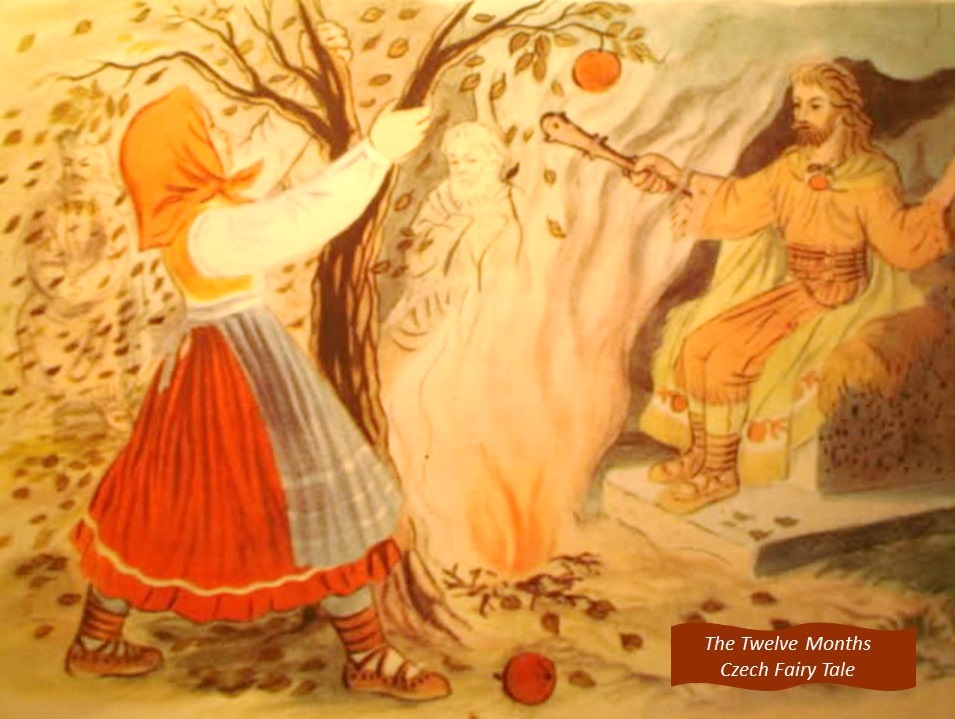
Then she picked another.
“That’s enough, Marushka!” September shouted. “Don’t pick any more!”
Marushka obeyed at once. Then she thanked the Months politely, bade them good-bye, and hurried home.
Holena and stepmother were more surprised than ever to see Marushka coming through the snow with red apples in her hands. They let her in and grabbed the apples from her.
“Where did you get them?” Holena demanded.
“High up on the mountain,” Marushka answered. “There are plenty of them growing there.”
“Plenty of them! And you only brought us two!” Holena cried angrily. “Or did you pick more and eat them yourself on the way home?”
“No, no, my dear sister,” Marushka said. “I haven’t eaten any, truly I haven’t. They wouldn’t let me pick any more than two. They shouted to me not to pick any more.”
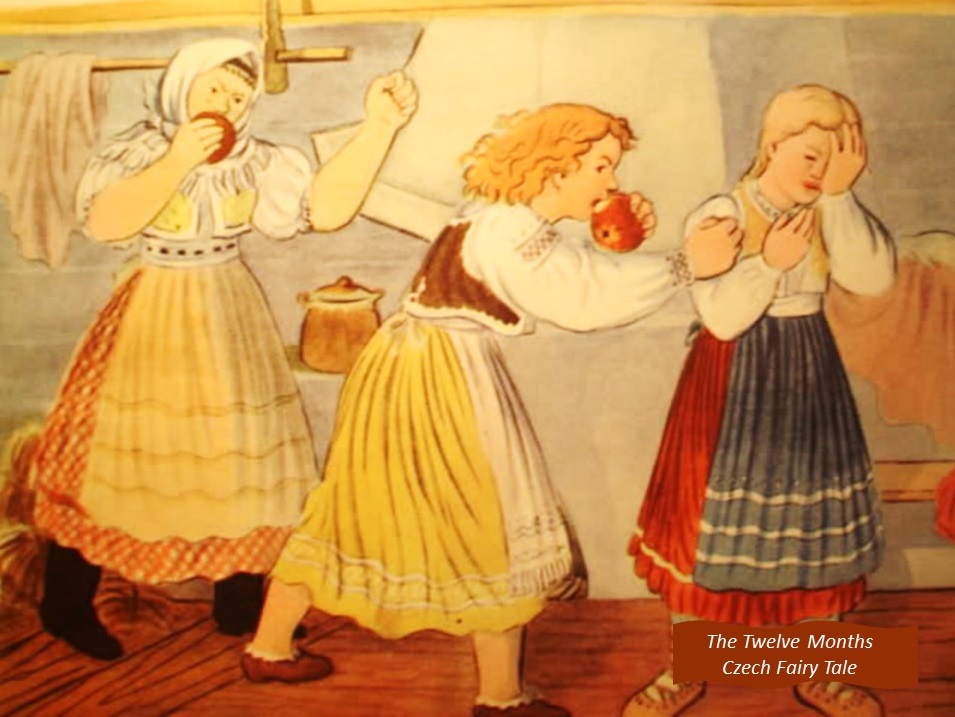
“I wish the lightning had struck you dead,” Holena sneered. “I’ve a good mind to beat you!”
After a time the greedy Holena left off her scolding to eat one of the apples. It had so delicious a flavor that she declared that she had never in her life tasted anything so good. Her mother said the same. When they had finished both apples they began to wish for more.
“Mother,” Holena said, “go get me my fur cloak. I’m going up the mountain myself. No use sending that lazy little slattern again, for she would only eat up all the apples on the way home. I’ll find that tree and when I pick the apples I’d like to see anybody stop me!”
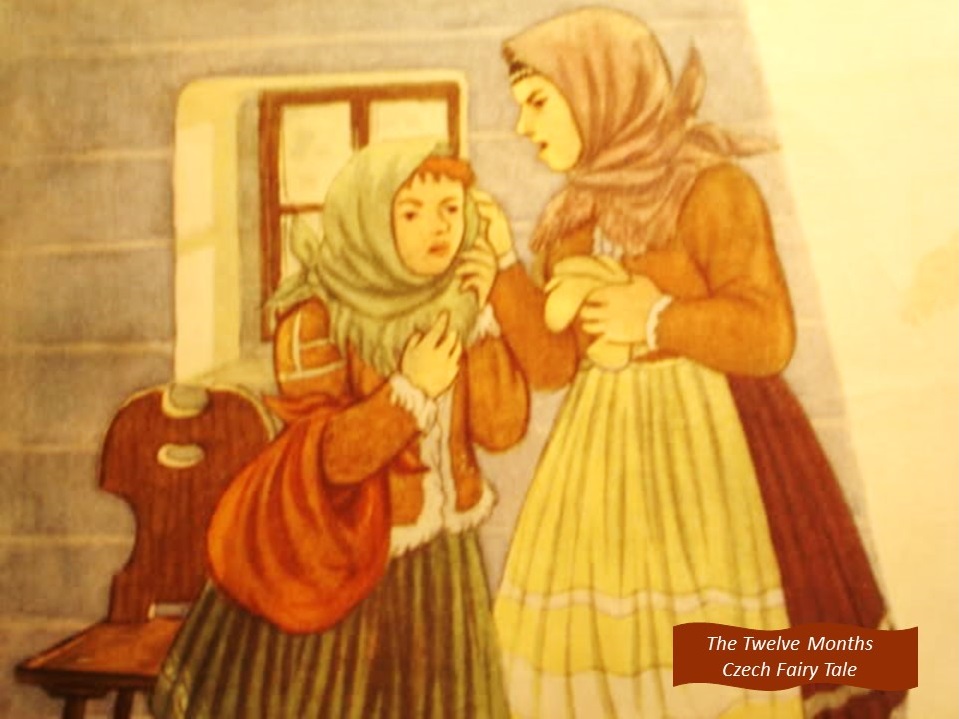
The mother begged Holena not to go out in such weather, but Holena was headstrong and would go.
She threw her fur cloak over her shoulders and put a shawl on her head and off she went up the mountain side.
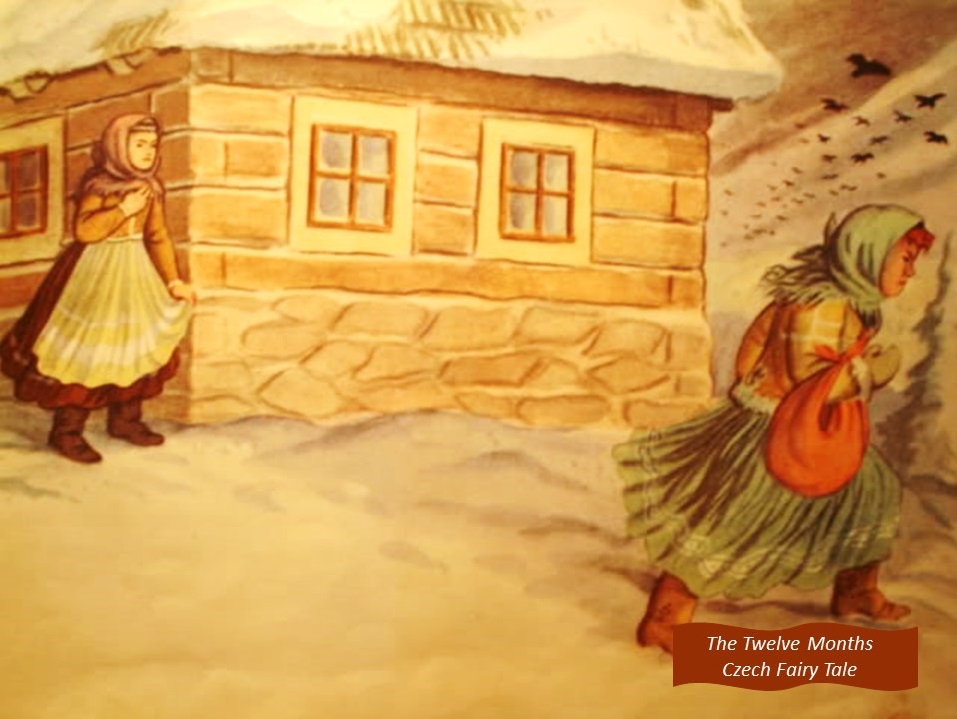
All around the snow lay deep with no track of man or beast in any direction. Holena wandered on and on determined to find those wonderful apples.
At last she saw a light in the distance and when she reached it she found it was the great fire about which the Twelve Months were seated.
At first she was frightened but, soon growing bold, she elbowed her way through the circle of men and without so much as saying: “By your leave,” she put out her hands to the fire.
She hadn’t even the courtesy to say: “Good-day.”
Great January frowned.
“Who are you?” he asked in a deep voice. “And what do you want?”
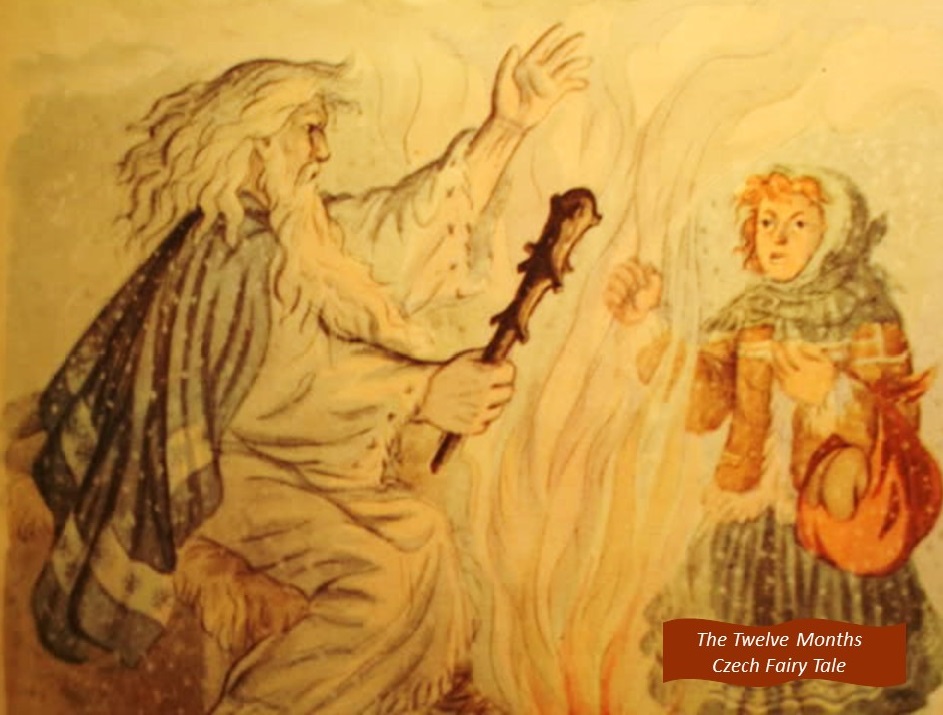
Holena looked at him rudely.
“You old fool, what business is it of yours who I am or what I want!”
She tossed her head airily and walked off into the forest.
The frown deepened on Great January’s brow. Slowly he stood up and waved the staff over his head. The fire died down. Then the sky grew dark; an icy wind blew over the mountain; and the snow began to fall so thickly it looked as if some one in the sky were emptying a huge feather-bed.
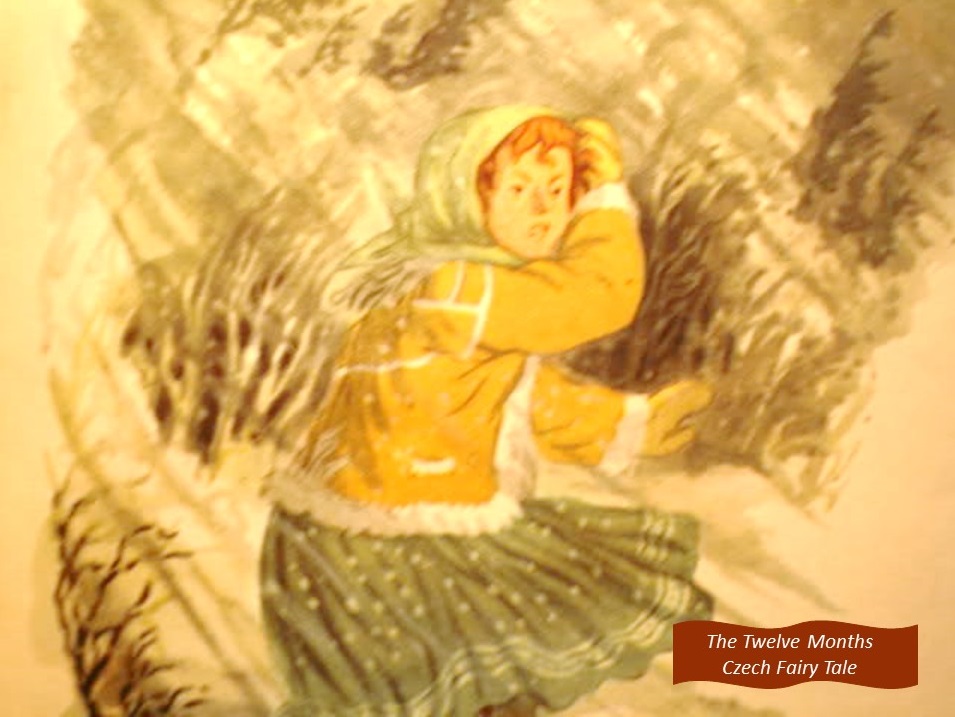
Holena could not see a step before her. She struggled on and on. Now she ran into a tree, now she fell into a snowdrift. In spite of her warm cloak her limbs began to weaken and grow numb. The snow kept on falling, the icy wind kept on blowing.
Did Holena at last begin to feel sorry that she had been so wicked and cruel to Marushka?
No, she did not. Instead, the colder she grew, the more bitterly she reviled Marushka in her heart, the more bitterly she reviled even the good God himself.
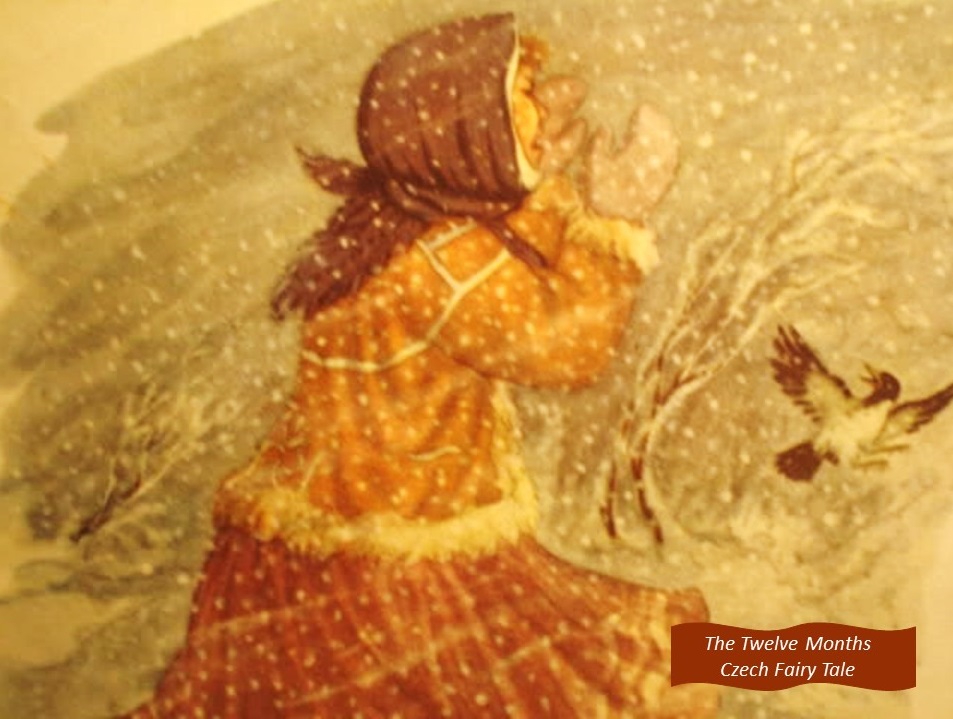
Meanwhile at home her mother waited for her and waited. She stood at the window as long as she could, then she opened the door and tried to peer through the storm. She waited and waited, but no Holena came.
“Oh dear, oh dear, what can be keeping her?” she thought to herself. “Does she like those apples so much that she can’t leave them, or what is it? I think I’ll have to go out myself and find her.”
So the stepmother put her fur cloak about her shoulders, threw a shawl over her head, and started out.
She called: “Holena! Holena!” but no one answered.
She struggled on and on up the mountain side. All around the snow lay deep with no track of man or beast in any direction.
“Holena! Holena!”
Still no answer.
The snow fell fast. The icy wind moaned on.
At home Marushka prepared the dinner and looked after the cow.
Still neither Holena nor the stepmother returned.
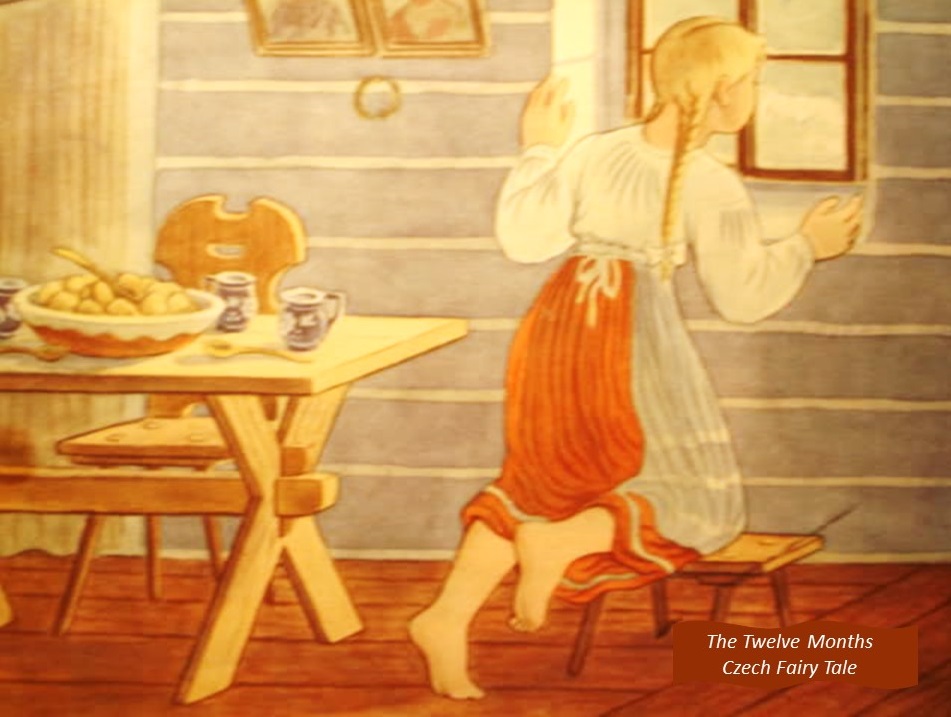
“What can they be doing all this time?” Marushka thought.
She ate her dinner alone and then sat down to work at the distaff.
The spindle filled and daylight faded and still no sign of Holena and her mother.
“Dear God in heaven, what can be keeping them!” Marushka cried anxiously. She peered out the window to see if they were coming.
The storm had spent itself. The wind had died down. The fields gleamed white in the snow and up in the sky the frosty stars were twinkling brightly. But not a living creature was in sight. Marushka knelt down and prayed for her sister and mother.
The next morning she prepared breakfast for them.
“They’ll be very cold and hungry,” she said to herself.
She waited for them but they didn’t come. She cooked dinner for them but they still didn’t come. In fact they never came, for they both froze to death on the mountain.
So our good little Marushka inherited the cottage and the garden and the cow.
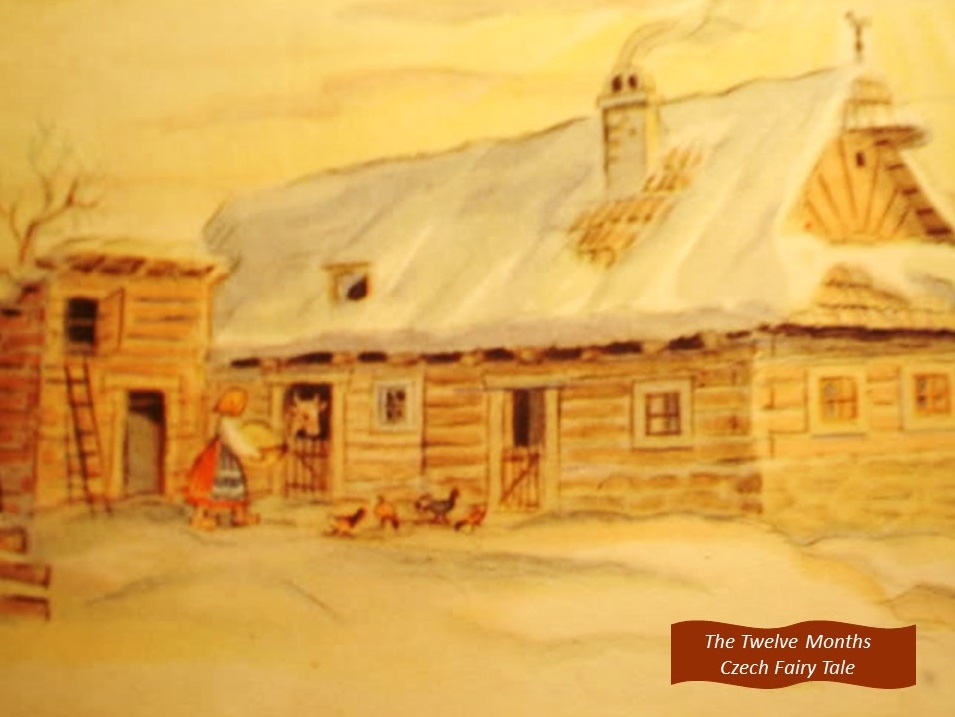
After a time she married a farmer. He made her a good husband and they lived together happily ever after.
The end.
——-
For this version, we looked to our book, The Shoemaker’s Apron: A Second Book of Czechoslovak Folk Tales by Parker Fillmore. Illustrations, unknown.
Thank you for your support – We appreciate you more than you know!
We know that you could spend hours, days, weeks and months finding some of this information yourselves – but at this website, we curate the best of what we find for you and place it easily and conveniently into one place. Please take a moment today to recognize our efforts and make a donation towards the operational costs of this site – your support keeps the site alive and keeps us searching for the best of our heritage to bring to you.
Remember, we rely solely on your donations to keep the project going.
Thank you in advance!
If you have not already subscribed to get TresBohemes.com delivered to your inbox, please use the form below now so you never miss another post.





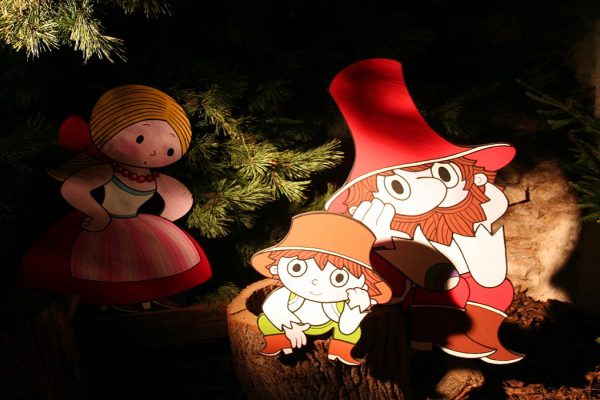
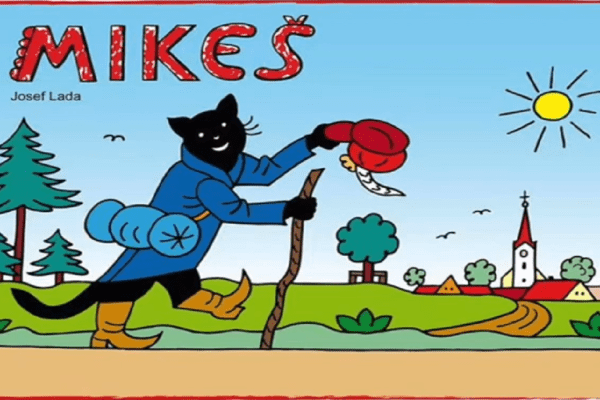















Fortunately and luckily, my three grandchildren live in Prague, so they can enjoy the Czech fairy tales in their original version. Thank you for bringing them in English for the children in the US and Canada.
Lubomir Novotny,
Toronto